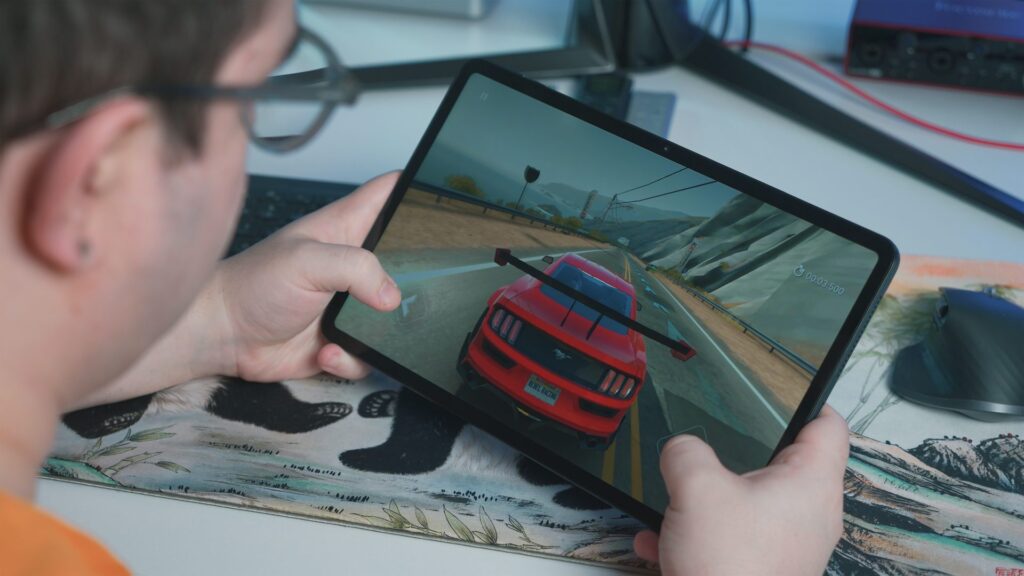Children’s excessive screen time can cause eating disorders leading to obesity. Unfortunately, many children have problems with obesity from a young age which continue as they grow.
More often, children are addicted consumers of energy drinks, snacks, and fast food during screen time, negatively impacting their health.
Obesity can cause damage to our children’s health, such as diabetes, heart problems, and high blood pressure.
Understanding Screen Time and Childhood Obesity
Screen time means spending time in front of the screens, such as watching TV or using computers, tablets, and smartphones. It is a sedentary activity, which means children are not physically active while using tech.
Research has shown that children that spend a lot of time in front of screens may become obese because eating while using tech is a common habit.

But why do children like screens so much? Well, when children use technology, their brain releases dopamine, which makes them feel satisfied.
Dopamine is also released when drinking alcohol. So, constant usage of tech can make children addicted to screens.
The Science Behind Screen Time and Obesity

Children’s sedentary position lowers their physical activities, so their bodies store the food into fat, which causes obesity.
The sedentary position also lowers children’s fitness levels and muscle and bone strength. Moreover, screen time affects children’s quality and quantity of sleep.
The well-known blue light emitted from screens contributes to children avoiding sleep at night or having worse sleep quality.
Screen time also affects children eating habits and disturbs their daily eating schedule. Children switch their healthy food habits with energy drinks, pizzas, sandwiches, snacks, cookies, and other sweets.
That is too much for children’s bodies, especially if these products are consumed repetitively (every day).
In other words, too much screen time doesn’t have a direct effect on obesity, but it leads to a change in behavior prone to obesity.
The Psychological Effects of Screen Time on Obesity
Excessive screen time develops lazy and melancholic behavior in children, so they resort to eating and laying all day. This mindset affects children’s brains and lowers their thinking, reasoning, analytical and cognitive skills.
Excessive screen time also affects their academic performance and leaves a messed up, confused, and distracted image of a student.

The more unhealthy food children consume in front of the screens, the more obese they become, which makes them feel emotionally broken and suffer from nervous breakdowns.
But increased stress also affects children’s emotions, making them think that food can fix their problems. It seems like we’re running in a circle here.
Obese children also suffer from depression. They don’t value their personalities because they are disappointed with their bodies.
Children’s self-esteem is an engine that pushes them to reach their goals. But lower self-esteem caused by obesity makes children passive players in life and ruins their future.
Mitigating the Risks of Screen Time for Childhood Obesity
Studies by the American Academy of Pediatrics state that children shouldn’t use tech for entertainment more than 2 hours daily.
Reaching that limit is really challenging with today’s children. So, here are some strategies for promoting tech-free activities:
- Set screen time limits and restrictions;
- Encourage fun activities like sports, arts, crafts, and such;
- Teach your children the risks of tech usage;
- Pair your children with other peers and encourage them to play tech-free games;
And never forget to emotionally support your child through the process of limiting screen time. Loving parents raise successful children!

Other Factors Contributing to Childhood Obesity
Studies show that genes can also be a cause of obesity. Although they have a small effect, genes can contribute to your child being obese.
Moreover, socioeconomic factors also affect obesity. People with lower social and economic power tend to have higher chances of developing obesity. Poor families resort to fast food and other cheap nutritive products to pass the month.
Being aware of these environmental factors helps parents battle obesity and lower the chances of their children developing it.
How to Promote a Healthy Lifestyle for Children
You have to start your children young. Teach them that eating sweets and fast food is bad even when they’re toddlers and hardly understand what you say.
Make eating healthy food a habit, just like you make going to the potty a habit. But, if you want your children to set healthy habits, you must set yourself as an example.

Practice eating healthy food and drinking sugar-free beverages as a family. Furthermore, you can contact your local community and schools to raise awareness about the importance of healthy food habits.
How to Talk to Children About Screen Time and Obesity
Children often don’t want to talk about serious things, such as obesity and the risks of excessive screen time usage.
For example, you can start by drawing a pyramid of food together, so you can hang it in your home. Doing something creative like this sets a strong ground for starting a conversation about obesity.
It’s even better if your children have learned about obesity at school. Tell them the facts and ask for their opinions. Address common concerns and misconceptions regarding obesity, and make conclusions together.
Measuring and Tracking Progress
Modern technology lets us measure and track both screen time and weight. To monitor screen time, you can use parental control apps, such as Qustodio, mSpy, Norton Family, etc.

Keep track of your children’s results and celebrate milestones. But, if your child is battling obesity, don’t celebrate with a cake.
Instead, continue to embrace healthy screen time and food habits, and make your children healthier.
Conclusion
We love our children no matter how they look. But obese children can’t accept their bodies, have low self-esteem, and have weaker relationships with peers.
So, parents and caregivers, switch off your children’s smartphones and go for a walk or find healthy recipes on the Internet.
Be a role model to your children. Teach them that a healthy body means a healthy spirit, and practice positive habits together.
FAQs
What is a healthy amount of screen time for children?
The healthy amount of screen time for children is nothing more than 2 hours for entertainment purposes.
How can I encourage my child to be more active?
Engage in outdoor activities together with your children, or pair them up with peers and encourage them to go play outside.
Can screen time be beneficial for children?
Yes, but only if it’s used for good purposes, such as learning and research.
What can I do if my child is already overweight or obese?
Go to the doctor for consultations, practice a healthier diet, and exercise more.
How do I know if my child is at risk for obesity?
If your children start having bad eating habits and slowly gain more weight, they are at risk for obesity.
ALSO READ: What are The Risks of Giving My Child a Smartphone







